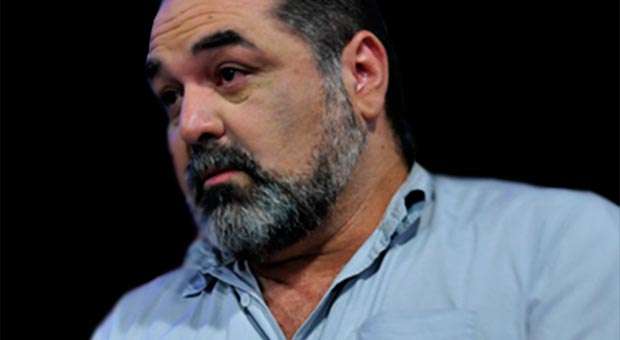¨Contigo pan y cebolla¨ is a play for all time. As Virgilio Piñera did with ¨Aire frio¨, Hector Quintero takes a snapshot of Cuban society and part of its history, with a huge load of universality. The play, written in 1962 and the following year won a mention in Casa de las Americas Award, was first brought to the stage in February 1964 by Sergio Corrieri with Teatro Estudio group.
Teatro D’Dos takes this time the challenge of staging a classic of vernacular theater, when it is just taking place the 50th anniversary of its premiere. Julio César Ramírez, director of the group, shared his views about the play and what it means assuming one of the most symbolic texts of Cuban theatre.
-For many, ¨ Contigo … stands as an essential moment of Cuban theatre for its popular essence. What do you think about that?
“It is one of the key texts in the history of contemporary theater. In my view, Hector Quintero is the great creator of comedy and master of dialogue , he knew to explore the essence of Cuban people, take it on the scene with a huge sense of closeness and identification with the public. He knew how to recreate, as anyone, the Cuban sense of humor. “
Like in almost all works of the author of ¨Sabado corto¨ and ¨El premio flaco¨, an almost perfect layout of the characters, combined with a precise radiograph of Cuban society, is exhibited. ” Contigo pan y cebolla” leaves us Lala Fundora, and inscribes her in the monument of the great female characters of Cuban theater.”
“This work narrates the battle of a woman for sustaining her family not only in practical terms of food and clothing, but from spirituality. Hector Quintero is a playwright who, like Abelardo Estorino and Alberto Pedro, must be permanently in the Cuban stage, because the dialogue with the public is extraordinary and for the need to liven up and preserve such interaction in the stage. “
We are witnessing a very Cuban play and simultaneously universal…
“That quality makes it a tremendous challenge. Quintero´s works do not require creating too much scenic fantasy because the characters pass through and from the truth. For actors and directors this poses a challenge: making the cast to become involved, to enjoy and be able to express those levels of reality that the play holds.
“Contigo… is a play that the public needs, knows and has incorporated into its imagery. It amazes me how people integrate it into their idea of Cuban theater. As it is a sitcom, it focuses on areas to be explored in order to understand its essence. “
Julio César Ramírez believes this will be an opportunity to analyze, from the boards, our present. It also means a way to access the self-reflection, to look into our family dynamic and, above all, to understand the message that, despite the economic, domestic or social difficulties, the important thing is to stay together.
However, despite its universality it has not been frequently taken to the scene. “Sergio Corrieri premiered it in 1964, and then Quintero took over the following staging, until a few years ago it was revived at Mella Theater. Now we are on that path and I think that the result will satisfy the public. “
This is the second comedy by Teatro D’Dos. Does it break in some way with the previous work?
“Teatro D’ Dos has much explored the family topic. Sometimes we think it is dead, because we work it a lot. However, there are always new edges to address as the one of this case which is the economic crisis in the family. “
“I think it perfectly fits with our prior performance, although we usually go to more dramatic texts. Since our creation, when we premiered ¨Escuela de los parientes¨, by Joaquin Lorenzo Luaces, we had not ventured again in comedy. And though it may be rare for Teatro D’Dos to move in that string, the text contains many of the issues we are interested in developing. “
This year marks the 50th anniversary of its premiere, how is the difference marked if there is any?
“Apparently everything is easy and daily, but an inner text lies in the bottom that reminds me Chekhov’s works, which Quintero knows taking them to the Cuban way with beauty and elegance.
“There are always challenges. We have to see the play as a staging that will go in crescendo. It will be a grueling test, especially if we consider that we do not conceive intermission, especially for actresses. In the history of Cuban theater there have been two unforgettable Lala Fundora: the one performed by Berta Martínez and then that of Alina Rodriguez. In our case this role will be doubled and played by Daysi Sanchez and Linet Cremata “.
“I think there is no need to establish differences because the play maintains its validity, it still keeps alive and time has not passed over it.”
By: Lourdes Benitez Cereijo










